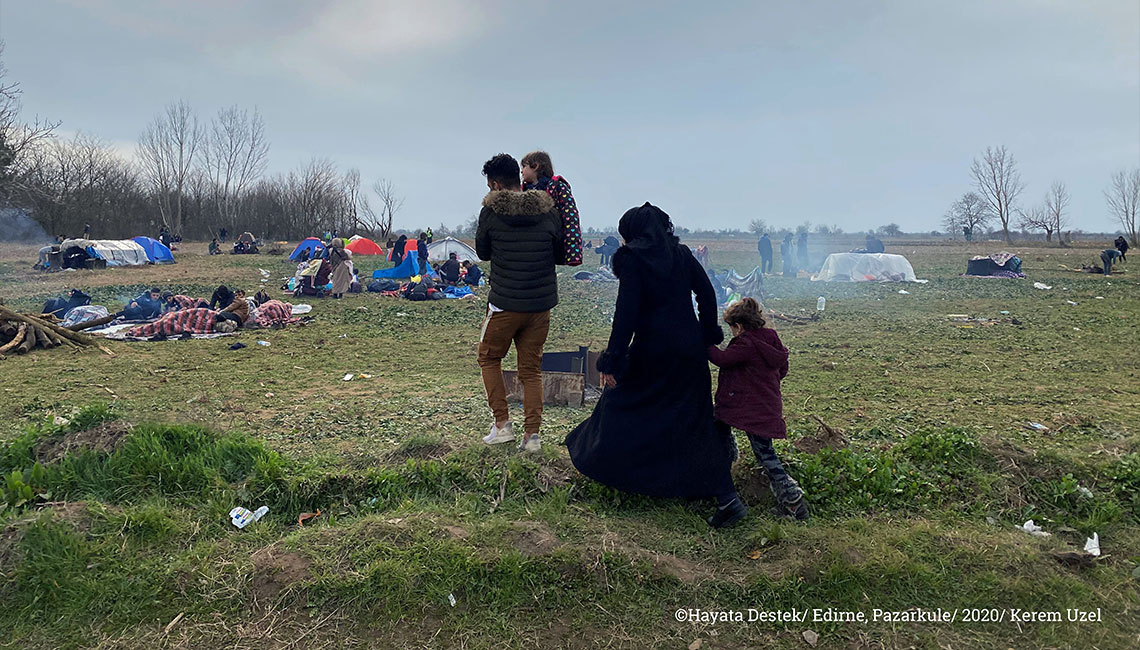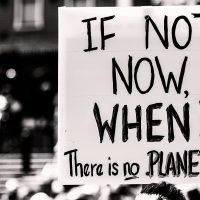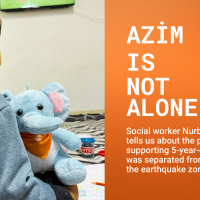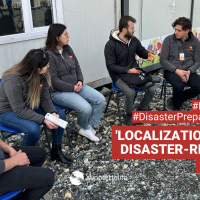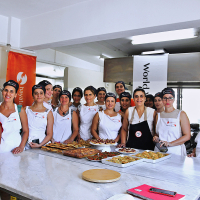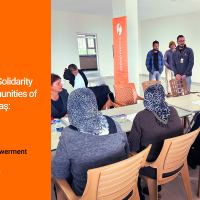If we define our own living space though predefined identities of belonging, norms for a ‘home;’ for the last two weeks Pazarkule is a ‘haunted house’. For the last two weeks the ‘no man’s land’ –the buffer zone between the two borders– spearhead defendable values of the modern age. This no man’s land has been home to open violations of people’s inalienable right to live.
Renowned French philosopher Jacques Derrida said reality has a ‘ghost-like’ aspect. So much so that even if we close our eyes tight we can feel the uncomfortable reality is there in all its being. However, perceiving, defining, accepting, affecting it can stay away from us just like an attempt to catch a ghost. Also I am not sure if it is possible to say we are enthusiastic about it. And here ‘migration’ which is as old a reality as the history of mankind displays this ghost-like character. Refugees, asylum seekers, and migrants become ghosts and ignored or are visualized and take hold in our words as tragic, destitute, passive figures. However, as the reality is approached from a different angle, pluralism these persons establish by coming together with their individual stories can represent hope, life, cultural wealth, productivity, and even a sense of belonging free from boundaries. If we hold a mirror to what has been going on both sides of Pazarkule border gate on Turkish-Greek border since late February, the shame it would reflect would cast a cloud on all our faces.
FANTASTIC REALITY
We have been witnessing a fantastic reality with images of tragedy we watch on television screens for two weeks. A human smuggler was telling tricks of his trade to cameras, a 28-year-old man was saying ‘I grew old before seeing the light of day,’ an anchorman was saying ‘let us see if they can cross to the other side’ to announce sailing of a boat full of adults and children, Greek police in charge of security was trying to sink a boat full of refugees before they can cross the sea border and was confiscating all belongings of refugees they caught after crossing land border to start with shoes so they cannot keep walking. Borders whose value can only be defined with their possibility of getting violated were pretexts of attempts against human life. The person whose life was attempted against was carrying his hope for a better life and desperation of being trapped at the same time. We watched the naked, crooked reality as if it was not happening to another person, to other persons who have the same rights as ourselves, but a spooky ghost story or a horror movie. The ‘house’ in Pazarkule became our haunted house in our land, which collapses day after day and where thousands of ghosts were trapped in.

THE PROLONGING LINE AND BEYOND
When authorities in Turkey declared border crossings would not be prevented on February 27th, people scrunched whatever they had into small backpacks and hit the road even the same evening. News travelled fast on social media. The following day thousands were on the road towards Edirne. Some jumped in buses, while some others took shuttle cars various organizations arranged, and yet others agreed with taxi drivers on whatever money they had. Those that left their houses once to survive or to find a better life were dreaming of crossing borders once again for the better.
As of today, the humanitarian crisis that refugees and migrants who force into borders starting with Pazarkule border gate to cross to Europe or wait hoping for a development completed its second week. At Pazarkule there are about 15,000 people. They are 20-21 years-old on average and are predominantly young men. Thousands of people including many children try to live in unfavorable conditions for two weeks at the buffer zone sweeping the border gate which gets drowned in pepper spray by Greek police as borders are pushed.
* We arrived in Pazarkule to join Support to Life team already working on the field at early hours of the day in the middle of the first week of waiting. As soon as we arrived pepper spray started to burn our throats. There was a commotion far away, in the middle of fields. Our colleagues who have been active on the field since the beginning of the crisis said this was a common sight. They gave us gas masks and sterile gloves. Initially we started to walk on the street reaching the border gate to have a look around. That was when we started to see the unrealistic environment. I will try to explain that ghost-like reality to you.

On both sides of the 500-step road, food lines for men and women are stretching out. It is not possible to see the end of the line from the beginning of it. These are lines of people that are expecting to get the meal given three times a day by humanitarian workers in the region. The line does not end before one meal finishes. Those that get in the line for breakfast take their lunches and go to the end of the line for dinner.
Fields extend behind the line of men alongside the road. The first young man I talked to in my Support to Life staff coat to determine his needs points at a not very far wire fence with his finger and says, “This much road, beyond it is Greek. We go, they throw gas. They caught me once and took my everything. They even took my phone. Now I cannot hear from anyone. Why do Greeks do this, sister? I will not stay there anyway.” This was a 19-year-old young man. He came from Syria 8 years ago. Some of his family was still in Syria. “I cannot go back, sister. If I do, they will draft me right away. I want to go to school but I cannot since the war began. Maybe I can study in Europe. I will stay here until the gate opens; I am not going to anywhere else.” Another young man at his side jumped in. He is older, at 24. His family is also in Syria: “In Europe you get passport in one year and then you can go to see your family and back. It is not like that here.” He also mentions continuing with his education that he had to quit due to war the year he started university. “I worked at many jobs since I came to Turkey. Some for only one day and some for longer. They pay very little, if they pay at all. There is no insurance. And they give too much work. Sometimes for 20 hours a day. And sometimes they curse a lot. We have to go.” As I was talking to the young men somebody touched me on the shoulder and I turned to look. Another young man with tired face: “My two daughters are missing. They are gone for two days. Help me find them.” I panic for a moment and ask names and ages of the girls, take notes. I ask the father if he informed the gendarmerie. “I did,” he says, “I got no response.” I have not been on the field for even an hour, I do not know what to say. I tell him I would let the authorities know but I cannot do anything else. He looks at me with disbelief in his eyes. He says “OK,” and drifts away in slow steps. Holding my notepad with his daughters’ names written on it, I watch him leave.
“WHY DO NOT THEY WANT US?”
23-year-old Malik who went to Jordan from Syria and then to Turkey in the hopes of seeking refuge in Europe comes forward. The young man looks at me directly in the eye and first asks me if I was a journalist. I tell him I was a humanitarian aid worker and try to determine urgent needs. He says “What for?” and catches me by surprise. He speaks English very well and tells me about his arrival at Pazarkule: “I was feeling like a rat. I saw a small piece of cheese and ran to get it. Apparently I ran into a trap and cannot get out of here now. If I want to return, I have nowhere to go back to. If I want to go, Greek soldiers do not let us pass the border.” Obviously Malik is respected by others around him. At times he turns to young men with him and explains to them in Arabic what he just told me, getting their approval. It looks like 5-6 young men are acting together and Malik is their spokesmen: “Why would anyone hit the road and leave his home and country? We came here because we want to live. Who hears my voice? A few days ago a foreign journalist came, asked questions that I responded to. Nothing changed. Nobody wants to see us, hear us, accept us. Why, are not we young people, cannot we produce, be useful?” Answers to his questions are so clear, yet so ambiguous… These young men are so full of life, yet so battered… Everyone has hope in his eyes and a big weariness at the same time… “Why are you meeting our urgent needs? How long more can we stay here? Why do they not accept us?” Overwhelmed with the weight of Malik’s questions I promise him to write an article mentioning his questions and complaints and leave his side. My heart sinks further.
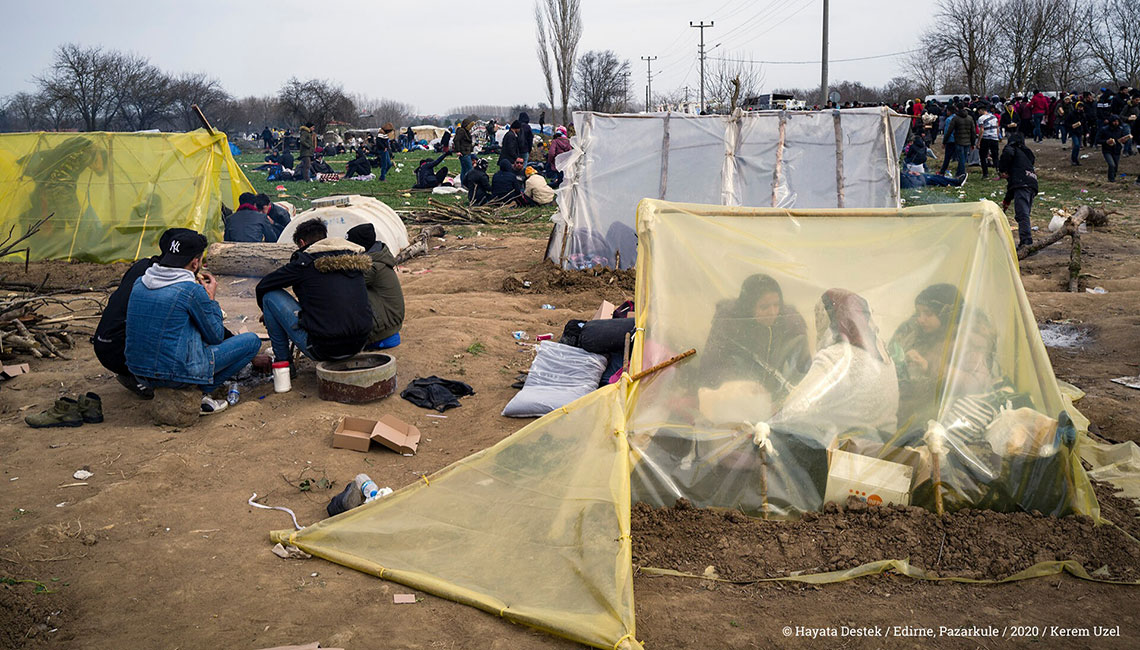
“THEY SAID THE GATES WERE OPEN SO WE CAME BUT…”
Behind the line of women on the other side of the road there are makeshift ‘tent-likes’. Pieces of linoleum, canvas ripped off from advertising signboards, and nylon spread over three or four pieces of wood tied together. Under this roof, blankets spread over a few pieces of cardboard. And sitting people leaning onto each other, sleeping children, people lying with half of their bodies outside tents… Most of those that continue to wait in Pazarkule are Afghan. Meaning, citizens of a country with near history overshadowed with wars and conflicts, where Taliban still reigns, which is shaken with a new attack every day, far from stability, where it is impossible to dream of a normal life. Afghans in Turkey can request international protection contrary to Syrians that are in temporary protection status. However, receiving that protection is a thorny and long way. For instance, it is noted that receiving this protection is almost impossible for single, young men. That means staying without an identity which deprives a person of access to basic services. The number of young Afghan men among those waiting in Pazarkule to cross to Europe is quite high. I approach an Afghan family. Two women are sitting on a log, trying to get warm from a piece of ember lying in front of them. They get up as I approach. I ask for their permission to chat. They hesitate at first but then the younger of women invite me to talk. They came with a couple of others they knew and have five children with them. They talk about how they have been trying to establish a normal life for years. Words of several people I talked to on the field stream and I hear all as if they talk with the same voice. Women continue by saying, “They said the gates were open and we came, but…” They turn to the three children sitting under the linoleum tent-like behind them. They were caught while trying to cross the border three days ago and all they had were confiscated on the other side of the border and they were deported to Pazarkule. They say their most urgent need is shoes. They point at the children and say even though they can get warm under blankets, they cannot keep staying bare feet.
A little further from the Afghan family there are 4-5 women sitting. They are in their 20’s. Their clothes in yellow, green, and purple colors are visible from under black blankets they wrapped themselves in. I think they are African. They try to dig the ground and open small holes. There are a few pieces of long branches aside, apparently they will try to establish themselves a tent. I approach them and request permission to talk which they agree to. They came a short while before from Somalia. They did not know each other before meeting at the house they stayed at in İstanbul, Aksaray. I ask them what they do for a living. They say they do not have jobs but stay in that house with support of a Somalian man. They do not provide any more details and I do not ask. They took a bus as soon as they heard the gates were open and arrived in Pazarkule. They want to go to Belgium. I ask them if they know anybody there. They say others from Somalia already went to Belgium but they do not know anyone in person. If they can go there, they will establish their lives just like others did. That is all.
And small children who run around unknowing of what is going on. At that moment one of them catches my eye. He must be around 4 years old. His mother was on line for food while he is in the middle of the road, his head turned to the sky and plays a game of walking on the road lines without looking. He takes a few steps and checks if he is still on the line. If he is successful, he claps happily and if his steps drifted away from the lines he goes quickly back on them. That child follows the only regular line in a chaotic scrawl with his steps playing the game he started in all his innocence and enthusiasm.

SUPPORTING LIFE
The ‘undesirables’ or ‘ghosts’ of the modern age, migrants, those who were forced to displace, asylum seekers, refugees are increasing in numbers due to deadlocks of this age. Reality makes itself felt in all its coldness when it is at the tip of the nose of a humanity whose eyes are closed tight. Our part at such a time and such a ground is leaving this state of silence, inaction, and ignorance aside to put forward our say, attitude, testimony, and advocacy about unacceptability of what is happening to support life.
The Support to Life team I am a member of has been in the coordination team working on the field since March 1st conducting humanitarian aid efforts. We detect the most urgent needs on the ground and try to meet those needs in the scope of division of labor in coordination team. Our efforts stand on a simple and clear basis: every person has the right to a humane, honorable life. Every contribution to efforts for establishing and protecting this right shall contribute to a better future and reality that can be formed together.
The protection activities mentioned above were conducted in Pazarkule, Edirne by Support to Life as Diakonie Katastrophenhilfe’s (DKH) implementing partner and with the financing of European Union through its Civil Protection and Humanitarian Aid Operations.

Çiğdem Usta Güner
Corporate Communication Expert
[email protected]
Thank you for reading the article and for coming this far. Now you can support life while you are here.
